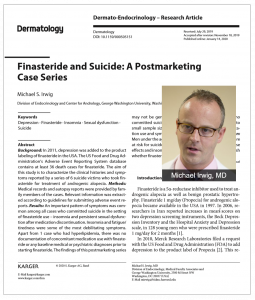February 20, 2020
Dear Friends:
 “Clinicians should be aware that men under the age of 40 who use finasteride for alopecia are at risk for suicide if they develop persistent sexual adverse effects and insomnia.”
“Clinicians should be aware that men under the age of 40 who use finasteride for alopecia are at risk for suicide if they develop persistent sexual adverse effects and insomnia.”
That, according to new research by Michael S. Irwig, MD, attending endocrinologist at Beth Israel Deaconess Medical Center in Boston, a teaching hospital of Harvard Medical School.
The aim of the study, titled Finasteride and Suicide: A Postmarketing Case Series and published in Dermatology, was to “characterize the clinical histories and symptoms” reported by suicide victims who took finasteride to treat hair loss.
In all, Dr. Irwig examined six such cases, based on medical records and autopsy reports provided by family members. Those cases, who lived in the USA, the UK and France, began taking finasteride between the ages of 19 and 36 years, and died between the ages of 25 and 42.
Apart from one case who had hyperlipidemia, there was no documentation of concomitant medication use with finasteride, or any baseline medical or psychiatric diagnoses, before starting the drug.
“The most prominent psychiatric symptoms were depression, anxiety, panic attacks, feelings of isolation and ‘brain fog,’” reports Dr. Irwig, while “Some of the most debilitating symptoms were insomnia and fatigue.”
Importantly, all six cases “reported insomnia and persistent sexual dysfunction” after discontinuing the medication.
In a separate effort seeking to bring deeper PFS awarenes to the medical community, Abdulmaged M. Traish, PhD, Professor of Biochemistry and Urology at Boston University School of Medicine, has published a review in Fertility and Sterility.
Titled Post-finasteride syndrome: a surmountable challenge for clinicians, it summarizes the findings from more than 250 studies published between 1989 to August 2019 on clinical use of finasteride and dutasteride.
“Until recently, the adverse effects of finasteride and dutasteride therapy on sexual function were not recognized or well understood. However, a body of emerging evidence suggests that the assessment of sexual side effects of finasteride in many clinical studies were not accurately captured or reported,” writes Traish.
“It is not surprising that almost all studies published to date do report increased sexual adverse effects,” he adds. “However, even when such sexual adverse events were reported, many argued that the numbers of subjects afflicted are small and propagated the falsehood that the adverse effects do resolve with continued treatment.
 “The number of subjects experiencing adverse events is neither small nor irrelevant, given the persistent nature of adverse events in susceptible individuals.”
“The number of subjects experiencing adverse events is neither small nor irrelevant, given the persistent nature of adverse events in susceptible individuals.”
Anyone living in the US who suffers from PFS should report his/her symptoms to the US Food and Drug Administration. Anyone living outside the US who suffers from PFS should report his/her symptoms to the US Food and Drug Administration as well as to his/her national drug-regulatory agency, as directed on our Report Your Side Effects page.
If you or a loved one are suffering from PFS, and feeling depressed or unstable, do not hesitate to contact the PFS Foundation via our Patient Support hotline: social@pfsfoundation.org
Thank you.
Related News
Epigenetic Modifications Do Occur in PFS Patients, New Research Demonstrates (July 20, 2019)
